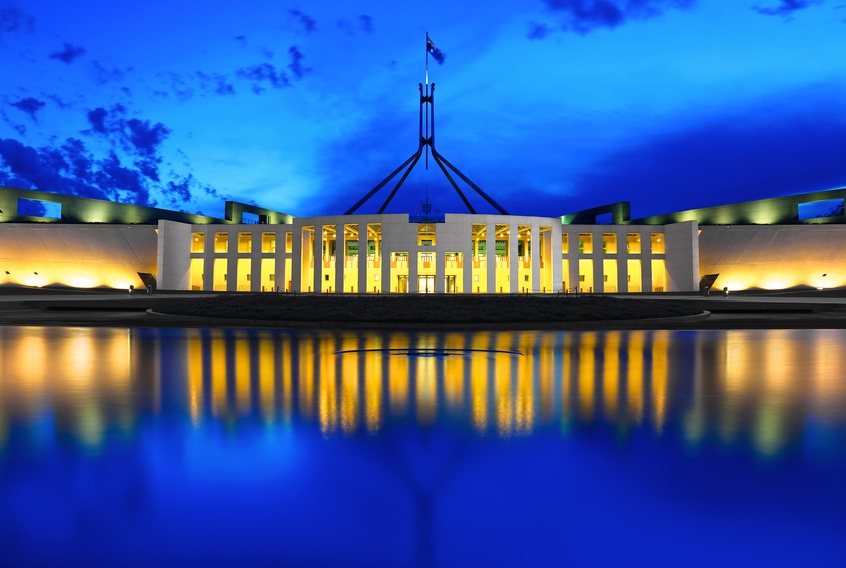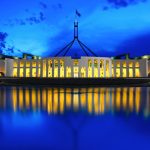Rediscovering the Advantages of Federalism
by Geoffrey de Q. Walker (Professor Emeritus from the University of Queensland)
(This article was originally taken from the Parliament of Australia website)
The new `age of federalism’
Worldwide interest in federalism is probably stronger today than at any other time in human history. [1] The old attitude of benign contempt toward it has been replaced by a growing conviction that it enables a country to have the best of both worlds—those of shared rule and self-rule, coordinated national government and diversity, creative experiment and liberty. As one Canadian authority says, `political leaders, leading intellectuals and even some journalists increasingly speak of federalism as a healthy, liberating and positive form of organisation.’ [2]
With the move of South Africa toward a federal structure, all the world’s physically large countries are now federations, except for China—and even that country has become a de facto federation by devolving more and more autonomy to the provinces. And you can see the same trend in countries that are not so big. When East Germany was released from the Soviet Union, there was never any question in the minds of its people that they would rejoin the nation as the five federal states that had been suppressed by Hitler and later by the Communists. Belgium became a federation in 1993 and Poland is heading in the same direction.
The few remaining highly centralised unitary nations—such as the United Kingdom, France, Spain, Indonesia, Sri Lanka and Italy—have all faced major crises of secession or separatism. In fact, the United Kingdom has been slowly disintegrating for over a century, with the struggle for home rule in the 1880s, the independence of Ireland in 1921, followed by Scottish and Welsh nationalism, and 30 years of civil war in Northern Ireland. The Blair government has taken hesitant steps towards a kind of federal structure, but there are some well-informed British people who think that an independent Scotland is a real possibility in the next decade.
Indonesia is devolving, and is looking at the Australian federal model (among others) as a way of doing it. Sri Lanka’s unitary structure has had catastrophic results, which might have been avoided if the various regions had possessed some degree of self-government under a federal arrangement. So whereas in 1939 Harold Laski, the political scientist, could say that `the epoch of federalism is over’, today it would be truer to say that, as the millennium approaches, we are in fact entering a new `age of federalism’. [3]
One reason for this favourable re-assessment is the ending of the great confrontation between democracy and tyranny that lasted from 1914 until the fall of the Berlin wall in 1989. Democracy’s success in that struggle removed one of the main justifications—or perceived justifications—for centralised government: the need to maintain an economy that could be mobilised. Again, the fall of the Soviet Union and its empire has undermined the appeal of all authoritarian, centralising ideologies, while the spread of human rights values has called in question all forms of elite governance, and created more and more pressure towards genuine citizen self-government. The general wariness towards Utopian ideologies has helped too, because federalism is not an ideology, it’s a pragmatic and prudential compromise combining shared rule on some matters with self-rule on others. [4]
Economic and technical change has helped too, but one very important reason has been the obvious stability, success and longevity of the four main largest democratic federations. It is not generally realised that, among the 180 countries of the world, only six have passed through the furnace of the twentieth century more or less intact. Of those six, four are federations—the United States, Canada, Australia and Switzerland. The other two are Sweden and New Zealand. The United Kingdom doesn’t qualify because of the secession of Ireland. While Sweden and New Zealand, of course, are unitary states, not federations, they account even today for only twelve million people between them. It is also worth noting that no federation has ever changed to a unitary system except as the result of a totalitarian takeover.
All over the world we are seeing centres for the study of federalism being set up in universities, and conferences and seminars being put together. In Australia very valuable work has been done by a number of scholars and think tanks. However these arguments have not really entered the mainstream of political debate. Within the ruling political-intellectual clerisy, as one might call it, attitudes to federalism still range from viewing it as a necessary evil to, as one recent work put it, `waiting for an appropriate time in which to abolish our spent state legislatures.’ [5] There is a kind of pseudo-pragmatism expressed in casual one-liners about the costs of a federal division of power, but these one-liners overlook both the costs of the alternative and—more importantly for our purposes today—take no account of the positive benefits of the federal model.
Advantages of a federal system
To the extent that the one-sided nature of the debate in Australia is the result of unavailability or lack of information about the proper working of a federal system, it may be useful to look at some of the main benefits of a federal system. I am going to put ten of these before you—no doubt there are more than ten, but ten will do for a start.
The right of choice and exit
When we think of political rights in a democracy, the ones we normally think about immediately are the right to vote and the right of free speech. They are very important, but there is a more long-standing political right, which is the liberty to decide whether or not to live under a particular system of government, the right to `vote with one’s feet’ by moving to a different state or country.
This has been recognised as a political right since at least the days of Plato. A modern illustration of how it works can be seen in the events leading up to the fall of the Soviet Union, because the communist governments were the only regimes in human history that almost completely suppressed the right of exit. The Soviet authorities knew very well that if their subjects should ever seize or be granted that right, the communist system would collapse instantly—and, of course, that’s what happened.
A federal structure allows people to compare different political systems operating in the same country and to act on those comparisons by voting with their feet. This process of comparison, choice and exit has occurred on a massive scale in Australia, especially in the eighties and early nineties. During those years Australians moved in huge numbers from the then heavily governed southern states to the then wide-open spaces of Queensland. So a federal constitution operates as a check on the ability of state and territory governments to exploit or oppress their citizens, and the special merit of the right of exit is that it is a self-help remedy—simple, cheap and effective. [6]
So when centralists give to federalism the disparaging label of `states’ rights’, they’re really obscuring the fact that it’s the people’s right to vote with their feet that is protected by the constitutional division of sovereignty in a federal system.
The possibility of experiment
The second advantage one could call the possibility of experiment.
In 1888 the British constitutional scholar James Bryce, later Viscount Bryce, published a monumental study of the United States political system, and that book, The American Commonwealth, became the standard reference work at Australia’s federal conventions. [7] We know from the historical record that a copy of it was kept on the table during all the debates, and it was continually referred to and assiduously studied by most of the delegates. So it is a valuable guide to the understanding and intentions of Australia’s founders.
In his appraisal of the American system, Bryce identified among the main benefits of federalism `the opportunities it affords for trying easily and safely, experiments which ought to be tried in legislation and administration’, [8] and other commentators over the years have made the same point.
In other words, the autonomy of the states allows the nearest thing to a controlled experiment that you can have in the sphere of law making. And being closer to the workface, state governments are in a better position than a national government to assess the costs as well as the benefits of particular policies, as revealed in that way. Not only that, but the possibility of competition among the states creates incentives for each one to experiment with ways of providing the best combination of public goods that will possibly attract people and resources from other states. [9]
All this is particularly important in times of rapid social change, because, as the philosopher Karl Mannheim said, `every major phase of social change constitutes a choice between alternatives.’ [10] In making that choice—as legislators have to every day—there is no way to know in advance which course of action is going to work best in dealing with new social problems or issues. Take for example the question of de facto relationships. They have recently attracted the attention of lawmakers because they exist today on a scale that is unprecedented in our history. So which is the better policy—the interventionist approach of the New South Wales De Facto Relationships Act, or the common law approach of Queensland and Western Australia? Well, the only way to know is to see what happens in practice and compare the results.
Besides making this kind of experiment possible, a federal system makes it harder for governments to dismiss evidence that undermines their favoured approach, because the results of experience in one’s own country are much harder to ignore than evidence from foreign lands.
And that’s one reason why lobby groups and ideologues and activists of all stripes tend to be rather hostile to federalism. Hardly a week passes without some lobby group lamenting the different approaches taken by state laws to current social or economic issues, and calling for uniform national legislation to deal with the problem. Well, behind these calls for uniformity, one can usually find a desire to impose one solution on the whole country, precisely so that evidence about the effectiveness of other approaches in Australian conditions will not become available, because unless experimentation can be suppressed, the lobbyists cannot isolate their theory from confrontation with conflicting evidence. [11]
In any event, when you look more closely at a lot of proposals for uniform legislation, the uniformity itself turns out to be an illusion. An example is the Federal Evidence Act of 1995, which was meant to be re-enacted by all the states. It was promoted with the claim that uniform legislation was needed to put an end to `the differences in the laws of evidence capable of affecting the outcome of litigation according to the State or Territory which is the venue of the trial.’ [12] The Act of 1995 certainly does away with some differences, but how does it do it? It does it by giving the trial judge a complete discretion as to whether to admit the evidence or not. Justice Einstein of the New South Wales Court of Appeal says that the exercise of these discretions is not normally reviewable on appeal. In other words, what the trial judge says, goes. So what you get is a substantial extension of the powers of individual trial judges in this fundamental question of admissibility, which often decides the outcome of a case. [13]
So instead of six different state laws and two territory laws capable of affecting the outcome of a case, we now in effect have as many different evidence laws as we have trial judges.
Of course, neither uniformity nor diversity is an advantage in itself. Sometimes the gains from nationwide uniformity will clearly outweigh the benefits of independent experimentation. That will usually be the case where there is long experience to draw on, for example in defence arrangements, the official language, railway gauges, currency, bills of exchange, weights and measures, and that sort of thing. But experimentation has special advantages in dealing with new problems presented in a rapidly changing society, or in developing new solutions when the old ones are no longer working.
Accommodating regional preferences and diversity
The third advantage is the accommodation of regional preferences and diversity. A federal constitution gives a country the flexibility to accommodate variations in economic bases, social tastes and attitudes. These characteristics correlate substantially with geography, and state laws in a federation can be adapted to local conditions in a way that is rather hard to do in a national unitary system. In that way, one can maximise overall satisfaction with government, and diminish to some extent the `winner take all’ problem inherent in raw democracy.
In Europe they call this principle `subsidiarity’, and it is enshrined in the 1992 Maastricht Treaty (although some critics say that it has just been `unenshrined’ by the Amsterdam Treaty of 1997, but that’s a different question). This enables government to become more in harmony with the people’s wishes. Professor Campbell Sharman of the University of Western Australia puts it this way: `federalism enhances the range of governmental solutions to any given problem and consequently makes the system as a whole more responsive to the preferences of groups and individuals.’ [14]
In addition, this outlet for minority or local views has the effect of strengthening overall national unity. When Wayne Goss was premier of Queensland he was making this point when he warned that abolishing the states, even de facto, could tear the country apart. [15] Conversely, it is not at all impossible that if Britain had adopted a federal structure, as many reformers in the last century wanted it to, the Irish might have preferred to stay in the United Kingdom (which might then have been called the Federated Kingdom) and a century of strife would have been avoided.
Even in Australia there are cultural and attitudinal differences between the states. If you doubt that, just look at the way in which the national media characterise Queenslanders or Western Australians, or the condescension you sometimes see in their references to Tasmanians. Some critics of federalism might acknowledge these differences, but they say that really the only possible justification for a federal system is social or cultural differences, and in Australia they are not marked enough to justify it, and that the state borders are purely arbitrary lines lacking a real social basis.
Professor Sharman says that those propositions are unfounded, and he gives these reasons:
To begin with, a sense of political community can exist quite independently of social differences between communities. Geographical contiguity, social interaction and a sharing of common problems all tend to create a feeling of community, whether it is a street, a neighbourhood or a state. The chestnut about the arbitrary nature of state boundaries is not only wrong as a geographical observation for many state borders—deserts, Bass Strait and the Murray River are hardly arbitrary lines—but fundamentally misconceives the nature and consequences of boundaries. Drawing political borders on a featureless plain is an arbitrary act, but once drawn, those lines rapidly acquire social reality. [16]
To his list of natural boundaries in Australia, one could add the Queensland border ranges, which mark off the eastern tropical and sub-tropical regions. Also, one could point to the simple factor of the huge distances between the main urban settled areas in Australia, which is probably more marked here than in any other country. Despite the wonders of modern communication, if people are really going to empathise and understand one another they still need to get together and talk face to face.
The argument that Australia is too uniform, too homogeneous, to be a federation also runs into the problem that federalism quite clearly works best when differences between states are not too marked and not too geographically delineated. Multi-ethnic federations are definitely the hardest ones to sustain. [17] The United States has had no serious secessionist movement since 1865 because, although it is a land of unbelievable diversity, the areas occupied by the competing minorities don’t correspond closely with political boundaries. For example, there is no state, or group of states, that is overwhelmingly black, or American Indian, or Jewish, or Catholic, or Asian or what have you. Then you contrast that with Canada, where most of the French-speaking population is concentrated in Quebec, which itself is overwhelmingly French-speaking, and the results are obvious. Similar tensions caused Singapore, which is overwhelmingly Chinese, to secede from the Malaysian federation. (or rather, it was expelled from Malaysia against its wishes)
So in that light, Australia’s relative uniformity from a social and cultural point of view is an argument for, and not against, a federal structure.
Participation in government and the countering of elitism
The fourth advantage is the greater ability to participate in government and the potential for countering elitism.
A federation is inherently more democratic than a unitary system, simply because there are more levels of government for popular opinion to affect. [18] The great historian Lord Acton went further; he said that in any country of significant size, popular government could only be preserved through a federal structure. Otherwise the result would be elite rule by a single city, such as London or Paris. [19]
This characteristic of decentralised government makes people in a federation more like active participants than passive recipients. It produces men and women who are citizens, rather than subjects, and gives governments a greater degree of legitimacy.
This more democratic aspect of federalism is especially important at a time when elitist theories of government, although dressed up in democratic garb, are once again in vogue. The struggle between government by the people and government by an elite is as a struggle as old as the western political tradition itself. In fact, political science was founded on that dichotomy, on that struggle, because Plato’s The Republic was largely his criticism of democracy as it operated at Athens. In its latest manifestation, the conflict between elitism and democracy has been said to explain modern politics more satisfactorily than the traditional division between left and right. [20] I would suggest this is the case, especially today when there are not great differences in actual policies between major parties, but major differences in how they would like to see the country run, and how they would like to see the democratic system work.
Elitism has of course been dominant through most of history. The democracy that we know is only two centuries old, a product of the French and American revolutions. When united with the English traditions of liberty and the rule of law, it has produced not only an unprecedented measure of individual freedom, but also a huge and unsurpassed increase in the material well-being of the people.
Still, elitism has never conceded defeat, and in the 1960s we started to see the sprouting of a hybrid of the old Platonic plant, and it is now in a position of dominance among the political class. This is a model that lies somewhere between the poles of democracy and elitism, a model in which the power of an enlightened minority is thought to be necessary to help a democracy to survive and progress. The variations on this theme have been called the `theories of democratic elitism’. The late Christopher Lasch, a prominent political scientist, deplored what he called `this paltry view of democracy that has come to prevail in our time’, as reduced to nothing more than a system for recruiting leaders, replacing the Jeffersonian ideal community of self-reliant, self-governing citizens with a mechanism for merely ensuring the circulation of elites. [21] So in this model the people become a sort of walk-on crowd who acclaim the rise or fall of the latest ruling group.
This new wave of elitism has gained momentum from the trend towards globalisation. The growth of a global consciousness is no doubt a good thing in a lot ways, but the other side of the coin is that it has opened the way for undemocratic bodies, such as the United Nations and some of its agencies, to implement an elitist agenda under the guise of promulgating `international norms’. [22] Some of you may remember that in the 1980s UNESCO (a United Nations agency) was promoting the idea of licensing of foreign journalists and television crews by the host country, which would have given governments the power to control what was said about them in the international media. Incredibly, Australia supported that initiative at the time, but it ran into the sand eventually, becoming an obsolete proposal with the growth of the Internet and the fax and so on. UNESCO is once again, I notice, looking for other ways to revive that idea, particularly by finding ways of controlling or censoring the Internet.
This is quite an interesting example. Wherever you see these dismissive references to public debate and these attempts to channel or guide or control political comment in the media, you know for sure that you are in the presence of elitism. It is a sure guide, a favourite—so are identity cards, incidentally, which is something else we had experience of in this country a few years ago. Control of the media is a sure litmus test of elitism.
It is interesting, because we have seen it promoted in Australia in recent years from the 1970s onwards. Elitist politicians since then have repeatedly attempted to instil an elitist version of the doctrine of free speech, under which the government would influence which political issues were debated, and who would debate them. In August-September 1975, the Whitlam government proposed a scheme whereby newspapers would be granted a licence to publish, and this licence would be granted or cancelled by a government body. [23] This idea was shelved as a result of strong public protest. The wave of fear that it generated was a material factor in the constitutional crisis of 1975, although you never hear it referred to in media accounts of those events.
The idea was shelved in 1975, but it was taken off the shelf again in 1991 with the Political Broadcasts and Political Disclosures Act, which prohibited all political advertising—paid or unpaid—on radio or television in the period leading up to an election. Blocks of free airtime were to be allocated to approved parties, again by a government body. The Act was overturned by the High Court, [24] but supporters of the idea are again looking for other ways of the government influencing and channelling political debate. These ideas, if they succeed, would be very detrimental to Australian democracy.
The philosopher William James and many after him have pointed out that in our search for reliable information we are guided by the questions that arise during argument about a given course of action. It is only through the test of debate that we come to understand what we know and what we still need to learn. [25] If you exclude, or sideline and marginalise the people from political debate, you deny them the incentive to become well informed.
This participatory character of federalism does lead to more abundant political debate at all levels, but critics of federalism don’t like that. They speak very negatively about it, and in fact are always criticising what they call `bickering’ between state leaders and federal leaders and people at all levels of government. Actually, this so-called `bickering’ is actually an advantage, because so long as people are free, they will disagree. In that sense, debate and conflict are an inescapable part of civilised life.
As Campbell Sharman points out, federalism’s more open structure will produce more overt political conflict, but it does this only as a reflection of the increased opportunity for individual and group access to the government process. Such conflict is clearly highly desirable. Federalism, he explains:
simply makes visible and public differences which would occur under any system of government. It is nonsense to think that problems would disappear if Australia became a unitary state and there would be few who would argue that the politics of bureaucratic intrigue are preferable to the open cut and thrust of competitive politics in the variety of forums provided by a federal structure. [26]
The federal division of powers protects liberty
The fifth advantage I want to put before you is that federalism is a protection of liberty. I mentioned earlier that a federal structure protects citizens from oppression or exploitation on the part of state governments, through the right of exit. But federalism is also a shield against arbitrary central government. Thomas Jefferson was very emphatic about that, so was Lord Bryce, who said that `federalism prevents the rise of a despotic central government, absorbing other powers, and menacing the private liberties of the citizen.’ [27]
The late Geoffrey Sawer of the Australian National University in Canberra was a very distinguished constitutional lawyer. Although he was definitely no friend of federalism, he did have to admit that federalism was, in itself, a protection of individual liberty.
Even in its rather battered condition, Australian federalism has proved its worth in this respect. For example, it was the premiers and other state political leaders who led the struggle against the 1991 political broadcasts ban. In fact, the New South Wales government was a plaintiff in the successful High Court challenge to that legislation, and that decision, I would suggest, was the perhaps the greatest advance in Australian political liberty since federation.
Better supervision of government
The sixth advantage is better supervision of government. Decentralised governments make better decisions than centralised ones, for a number of reasons.
Lord Bryce said that in the United States the growth of polity had been aided by the fact that state governments were watched more closely by the people than Congress was. [28] He said, by way of analogue, that Britain adopted the same policy in its management and government of its self-governing colonies. In other words, the British system of colonial self-government, which we had here after 1855—and, in various forms, a little earlier—was to grant the colonies complete self-government in relation to domestic issues, subject to certain exceptions.
That may seem obvious, because we accept that that’s the way it happened in Australia and we think that’s the only way it could happen. But you should contrast that with the French approach to colonial self-government, which was—and still is—to allow the residents of the colonies to elect members of the National Parliament in Paris, whereas the colonies themselves are governed simply as overseas departments of France itself. So this idea of local self-government as promoting better supervision is one which has been implemented even by Britain itself.
This closer supervision is a function of lower monitoring costs. There are fewer programs and employees at state levels, and the amounts of tax revenues are smaller. Citizens can exercise more effective control when everything is on a smaller scale. [29] Large governments encourage wasteful lobbying by interest groups engaged in what economists call `rent-seeking’, the pursuit of special group benefits or privileges. Rent-seeking is easier in large than in small governments, because it is harder for ordinary citizens to see who is preying on them.
In that case, you might say, well hold on—how do you account for the financial disasters in Victoria, South Australia and Western Australia during the late 1980s? Here, it seems, the supervisory mechanism failed as a result of media behaviour. There was information about the looming disasters, but—largely because of the preferences of reporters and editors—it was never placed before the public. You might remember that when Paul Keating was Treasurer, he attacked the Melbourne Ageand the ABC in Melbourne for, as he put it, `covering up’ the Victorian government’s evolving financial debacles, [30] and similar charges have been against the media in the other three affected states.
The greater ease of supervising state government is partly a function of the proposition that a physically large country is ungovernable unless you have a federal system. Jefferson was emphatic that the United States, which in his day was only a fraction of its present size, was `too large to have all its affairs directed by a single government’. [31] In our time even a centralist like Geoffrey Sawer had to admit that, in Australia, geographical factors made a great degree of local self-government inevitable. [32]
Stability
The seventh advantage is stability. Stability is a cardinal virtue in government. Stable government enables individuals and groups to plan their activities with some confidence, and so makes innovation and lasting progress possible.
Political stability is much valued by ordinary people, because they are the ones most likely to suffer from sudden shocks or changes in direction in the government of the country. So in that sense a stable government is more democratic than an unstable one, other things being equal.
Stability is obviously a very high priority with the Australian people, as you can see from the tendency of people to vote for different political parties in the two houses of parliament. This is a practice designed to reduce the de-stabilising potential of transient majorities in the lower house.
Professor Brian Galligan of Melbourne University supports this assessment, with his observation that the traditional literature on Australian politics has exaggerated the radical character of the national ethos, while at the same time overlooking the stabilising effect of the Constitution. [33]
Why is it more stable? The federal compact, Galligan says, deals in an ingenious way with the problem of the multiplicity of competing answers and the lack of obvious solutions, by setting government institutions against one another, by breaking up national majorities and pitting institutions against one another. [34] And the people obviously prefer that, as we can see from their votes in constitutional referendums.
This means that, in a federation, sweeping reforms are more difficult. But, at the same time, it also means that sweeping reforms are less likely to be needed. Successive Australian federal governments have encountered more frustrations in their efforts to restructure the economy than their counterparts in Britain or New Zealand. But, at the same time, the Australian economy was not in such dire need of restructuring, because the federal system had effectively prevented earlier governments from matching the excesses of collectivism attained in pre-Thatcher Britain, [35] or the bureaucratic wilderness of `Muldoonery’ in New Zealand. Opinion polls in those two countries show that most people consider the reforms made by the Thatcher and Lange governments to have been beneficial, but the process was a stressful one, and a destabilising one. In New Zealand it led to public pressures that resulted in substantial changes, not necessarily for the better, in the whole system of parliamentary representation.
Fail-safe design
The eighth advantage could be called `fail-safe design’. Besides acting as a brake on extreme or impetuous federal government activity, federalism cushions the nation as a whole from the full impact of government errors or other reverses. Lord Bryce likened a federal nation to a ship built with watertight compartments. [36] Professor Watts in Canada uses the more modern fail-safe analogy. He says:
The redundancies within federations provide fail-safe mechanisms and safety valves enabling one subsystem within a federation to respond to needs when another fails to. In this sense, the very inefficiencies about which there are complaints may be the source of a longer-run basic effectiveness. [37]
For the same reason, damage control can bring results more quickly when the impact or a mistake or misfortune can be localised in this way. We’ve seen how the three affected states I mentioned have come through their tribulations, and in the process, interestingly, have adopted solutions from other Australian states to the problems which they have encountered.
When it comes to repairing the damage done by a policy area at the Commonwealth level, where the Commonwealth has a monopoly—such as monetary policy—then the process takes much longer. We had in the 1970s and 1980s in this country unprecedented inflation, on a scale unknown in history. It began with Frank Crean’s budget of 1973, which has only recently been brought under control almost a generation later.
One shouldn’t assume that a healthy economy requires or is even assisted by comprehensive central control. In fact economists are increasingly taking the view that the role of national government is best confined to establishing general rules that set an overall framework for market processes, [38] and that centralised fiscal control creates what they call a `fiscal illusion’, disguising the true cost of public services, making government look smaller than it is, [39] and perpetuating what they call `a collectivist hand-out culture’. [40]
Some commentators such as P.P. McGuinness, Alan Wood and others maintain that it is quite practicable to devolve tax and fiscal policy powers to the states because, under a unified currency, it is not possible for one state to conduct an inflationary fiscal policy by running budget deficits very long. Most of the powers the Commonwealth exercises in relation to economic policy, McGuinness says, are not only unnecessary, but counter-productive: `In fact, the need for central macro-economic policy is largely the product of over-regulation and mistaken micro-economic policies.’ [41]
Competition and efficiency in government
The ninth advantage is the benefit of competition on efficiency in governments. Like all other human institutions, governments, if you give them the chance, will tend to behave like monopolists. A government that can restrict comparisons and prevent people from voting with their feet is in the position of a classic single-firm monopolist, and it can be as inefficient and oppressive as it likes. The paradigm case, of course, is the former Soviet Union.
Inefficiency in government usually takes either of two forms, sometimes both. One is high taxes, which is easy to see, and the other, which is less easy to see, is one which has been expounded by the economists who have developed the `public choice’ theory of government. This model is based on the proposition that government agents (meaning elected representatives and public servants) act in the same way as other people, that is from motives of rational self-interest. Consequently, they have a built-in incentive to administer programs in such a way as to minimise the proportion of the program’s budget that is actually received by the intended beneficiaries, while the remainder, the surplus, is used to further the interests of the administrators.
A government that enjoys monopoly power—such as monopoly power over income tax, which ours has, in effect—is able to generate a surplus for discretionary use in this way. [42] An example with which I’m all too familiar is Australia’s public university system. In the days when our universities were administered by the states, they were far from perfect, but they were very efficient, lean bodies, with the flattened management profile that is so much admired today. A dean’s administrative duties seldom took up so much as one day per week, and even the vice-chancellor was usually a part-time official, who also did teaching and research. Commonwealth involvement consisted of capital grants and funding Commonwealth scholarships, which could be obtained by any student who did better than average at the final school examination, with the result that fully 70 per cent of students completed their tertiary education paying no fees at all.
The transformation began in 1974 when the Commonwealth assumed financial control of the universities, and this gave universities access to the Commonwealth monopoly over income taxation. This surplus was increasingly used to expand the bureaucracy both in the universities and the government itself. Finally, the Dawkins revolution converted higher education into a complete centralised command economy, just when the rest of the world was abandoning that model.
This created hugely increased paperwork demands and generated whole new layers of career bureaucracy in the universities. At the university with which I am most familiar the ratio of teaching academics to administrative staff sank to 0.6 to 1. In other words, there were substantially more full-time bureaucrats than teaching staff, and that was not counting full-time deans and heads of departments and so on. This is a very disturbing fact and a few of us tried to bring it up for debate in the university system, but without success. So you have this enormous growth in non-academic activity. You also have the fact that now nearly all students pay fees, and build up large debts through the HECS (Higher Education Contribution Scheme) system. Academic salaries in real terms are a little over one-third of the level they were at in the 1960s, [43] even though tenure has been all but abolished. And when the university budget has to be cut, it is invariably the teaching academics, not the administrators, who bear the weight of the retrenchments.
On top of that, the universities’ secondary function, research, has been totally centralised in the Australian Research Council system and utterly politicised. At least, that was the situation when I left academic life in late 1996.
Research in Australia and abroad shows that competitive federalism creates a competitive market for public goods, and provides consumer taxpayers with their preferred mix of public goods at the lowest tax price. [44]
These gains in efficiency are not affected by the smaller size of state governments, because it appears that there are actually very few economies of scale in government, except in the areas of defence and foreign relations. As Gordon Tullock, the Nobel laureate who has written on this subject points out, this is not surprising because large organisations generally are not significantly better at dealing with complex problems than smaller ones. He points out that the Cray computer is the world’s most complex computer, but the Cray company is not a very big computer company. Further, he points out, many of the functions carried out by national governments are not actually complex at all—notably the distribution of health and social welfare payments (which is the largest single proportion of their work). The actual provision of health services is quite complex, he says, but that is performed by the small organisations such as medical practices and hospitals. So the part of the health/social welfare activity that is centralised is actually the simplest part. [45]
Even in centralised governments, a great many decisions have to be made at a low level, [46] which is why all Commonwealth departments of any size have offices in state capitals, where a lot of the real core work is done.
This leads to an issue that often arises in discussions on federalism, and that is the question of duplication. This can be vertical duplication (that is, overlap between federal and state systems) or horizontal (that is, duplication between states). As to the vertical type, the fact that there is a Commonwealth department of health and a state department of health doesn’t necessarily mean that they’re duplicating each other’s work, any more than the state office of the Commonwealth Department of Social Security is necessarily duplicating the work of its own head office in Canberra. They may be looking at different aspects of the problem.
A common criticism based on vertical duplication is that, with two sets of politicians, Australia is over-governed, and that it would be better to do away with the lower tier. Well, let’s look at some figures. In 1996 Australia had 576 state politicians. [47] That’s not a huge number when you compare it to the 380 000 people employed in government, not counting those in education, health care or social welfare, or those working in government corporations. But it is unrealistic to suppose that abolishing the states would lead to a net saving of those 576 positions plus support staffs, because centralists themselves always suggest replacing the states with `regions’, usually between 20 and 37 in number. [48] That structure would require the appointment of regional governors, prefects, sub-prefects, Gauleiter or what have you, and with support staffs. France’s regions are administered by an elite prefectoral corps, corps prfectoral, a highly-paid class who live like diplomats in their own country, with official residences, servants and entertainment budgets. But sooner or later any centralised government of ours would have to do as France did, and create regional elected assemblies, with legislative powers, probably somewhere between 20 and 37 in number. By that time, any savings would have been dissipated.
In any event, Australia spends 38 per cent of its gross domestic product on general government expenditure, which is already lower than Britain’s 44 per cent, or France’s 52 per cent. [49]
A variation of this argument is that Australia’s population is just too small to support six state governments. Well let’s look at some comparisons. In 1788 the population of the thirteen American states was three million—quite a bit less than the population of Australia’s six states in 1901. The United States didn’t match Australia’s current population (of about 18 million) until 1840. Switzerland, that land of supreme efficiency, has only 5.5 million people for its 26 states, or cantons. It’s a more decentralised federation than Australia, with even some defence functions being performed by the cantons.
To some extent, horizontal duplication is unavoidable in a large country. As Wolfgag Kasper says, `all competition requires some measure of duplication.’ [50] If you think back to the days of the old Telecom monopoly, when the end of the monopoly was being discussed, the critics of that course of action argued that if the monopoly were taken away, call charges would rise and service would decline because of the costs of duplication. But we all know that exactly the opposite has happened, and Telstra is unrecognisable compared with the surly monster of old.
A competitive edge for the nation
The final advantage is one that even the advocates of federalism sometimes overlook, and that is its value as a means of enhancing, through competition, the international competitiveness of the country as a whole. This is a familiar principle in other areas—it’s the principle on which we select international sporting teams, for example. We deliberately encourage rivalry between local, regional and state teams in order to identify the team that is going to represent us in the Olympics or whatever. Competitive federalism harnesses that principle, which Australia has used with unparalleled success in the sporting field, to the goal of earning a better standard of living for all.
In case you think that it’s not a principle that would work in the economics sphere, just look at the example of China. China only became an international economic power once it became a de facto federation, by allowing the provinces more autonomy and encouraging them to compete. Professor Wolfgang Kasper in Canberra has done a lot of good work on this, and he argues that federations have a real advantage in discovering the rules and devices that assist international competitiveness. [51]
Before leaving this question of efficiency, one can never debate this topic without some reference to the old problem of railway gauges, because we are always told that Australia’s diversity of railway gauges is a product of federalism. Well, that can’t be right, of course, because the railway networks were all completed well before federation. Maybe people mean that if we had a unitary system we would have unified the system long before now.
That argument does not hold up, because the United Kingdom, which is unitary, had all the railway gauges that we have, plus the seven foot broad gauge, which was particularly widespread in the densely populated south. Yet all their different gauges were standardised by the 1880s, with incredible speed. In 1872, 380 kilometres of double track with point work in the stations were completed within a period of fourteen days. The 700 kilometre line from London to Penzance was converted in a single weekend. In the United States in 1861 there were twenty different railway gauges. They were all converted over two decades, and in July 1881, 3 000 workmen converted the entire 900 kilometres of the Illinois central southern region by 3.00pm on a single day. [52]
Obviously, our federal structure does not explain why we have not got on very successfully with the task of standardising our railways. The answer may be, as Gary Sturgess suggests, the fact that, from the outset, Australia’s railways were government-owned. In the absence of the profit motive, the most powerful motivation is the desire for the quiet life.
Conclusion
All human institutions are imperfect and they’re all open to criticism. But for a government model that has been so outstandingly successful, Australia’s federal system has been subjected to undue negative comment. Minor inconveniences have been given an inflated importance, and critics have never stopped to consider the costs and disadvantages of a rival system.
Australian federalism could start to realise its full potential if the three branches of Commonwealth government took into account the benefits of experimentation, of diversity and multi-level democratic participation. They must recognise that both competition and co-operation have their place in a federation.
The states will also have to adjust their thinking. They will have to stop shunting the hard problems down the freeway to Canberra. In the general population some people at first may be disconcerted by the wider range of choices available, but that has happened before. In the late 1960s when the Trade Practices Act was breaking down the old price cartels, there were some consumers who actually complained that prices were no longer uniform. Eventually these people realised that just by shopping around a bit—in other words, by taking responsibility for their own lives and their own choices—they could enjoy a substantially higher living standard than before. That same process will occur when the present governmental cartel in Australia starts to crack.
Those who contrast the veneration with which Americans view their 1788 Constitution with the alleged apathy of Australians towards theirs overlook the fact that for the first hundred years of its life, the American Constitution was intensely unpopular, in a way in which Australia’s Federal Constitution has not been in its own first hundred years. [53] The tensions that emerged from the outset over central power in the United States led Chief Justice Marshall to write in 1832 that `our Constitution cannot last’. [54] By the 1850s a lot of commentators were saying that the Union was in its `death throes’. [55]In Australia, even the committed centralists have stopped short of such despairing assessments.
An awareness of the benefits of federalism will make our constitutional debate a more equal and a more fruitful one. This will mean recognising that in a properly working federation, government is more adaptable to the preferences of the people, more open to experiment and its rational evaluation, more resistant to shock and misadventure, and more stable. Its decentralised, participatory nature is a buttress of liberty, a counterweight to elitism, and a seedbed of social capital. It fosters the traditionally Australian, but currently atrophying, qualities of responsibility and self-reliance. Through greater ease of monitoring and the action of competition, it makes government less of a burden on the people. It is desirable in a small country and indispensable in a large one such as ours.
Question — I would like to ask you if your feeling about the quality of federalism is affected by such things the upcoming New South Wales election [April 1999]—with its enormous ballot papers and huge proliferation of minor candidates and so on. Do you have any comment about that?
Geoffrey Walker — I don’t think that has anything to do with federalism, it has to do with another problem, which is, shall we say, the `political cartelisation’ of Australian life, the lack of effective choice between major blocks of different policies. What people are trying to do is to express a view on something that is near and dear to their hearts. That’s why you have all these little parties being put up for the upper house. But that’s a very clumsy way of doing it. It’s the only way people have at the moment, it’s the only way they have in the Senate, or in most unitary countries for that matter.
A much better way would be to introduce the Swiss system of direct democracy, where people can petition for a referendum on a particular question, then you wouldn’t need this proliferation of parties.
Question — With your admiration of federalism as a means for Australia for the future, can you see a reason for the reluctance to an extension of federalism by the creation of new states such as New England (part of New South Wales) and North Queensland? In reality, are we really six unitary states here, with the Commonwealth position as yet undetermined?
Geoffrey Walker — There is always the opportunity under our Constitution to create new states, and the New England case was a good example. In fact it was a very innovatory plan in a lot of ways. It had some of the Swiss institutions I’ve mentioned. They were building direct democracy into their system. But obviously people were happy enough with New South Wales as it was, because even a majority in New England couldn’t be mustered. It’s just something that might happen and it might not. In Switzerland a few years ago they created a new canton of Jura, because the people of Jura wanted it. Well, if people want it, why shouldn’t they have it? We’re far from having any Balkanisation in this country and if people think that the existing units are too big, well, why not?
Question — I’d like to raise with you the disparities amongst the governance of nations. Once upon a time there were kings, queens and emperors predominantly. Most of those have gone, but there are immense differences between the governance of states. For example, the Labor Government threw out the draft criminal code back in 1973-74, and we are still struggling to get a uniform model code around the rest of the country. Queanbeyan has a different criminal law to Canberra, which is ridiculous.
These immense discrepancies between the governance of states mean that it is going to be much more difficult to have states combining and being common in their approach to life and policy, so that in fact we are still left with the national differences that used to exist under kings, queens and emperors. Do you concede that there is a need for more standardisation in the way states are governed?
Geoffrey Walker — I don’t regard diversity as a problem. I regard it as a basis for experimentation and a basis for people to get what they prefer. If South Australians want to experiment with making marijuana an infringement-notice offence, why shouldn’t they? And if Queenslanders don’t want to, why should they have to? I haven’t looked lately at the drafts of the uniform criminal code. It might be a good idea or it might not, but it’s not automatically a good idea, just as the legislation seeking uniformity of the laws of evidence has not turned out to be a good idea, it has just enhanced the power of the judge.
In a federal system, you should have uniformity if the benefits exceed the detriments; but you can’t blame people for not accepting a uniform model if it is detrimental, as is the legislation seeking uniformity of the laws of evidence. So I don’t see it as a problem—I see it as a field for creative experimentation.
Question — I would like to ask two questions. In places like India and Pakistan, which are federal nations, the chief body has power to dismiss the states, but that doesn’t exist in this country. That’s one issue, and the second issue is the Commonwealth versus states issue, where in Australia there is a specific set of powers to the Commonwealth with residual power to the states. They are two different types of relationships—one has an ability to dismiss a government, and the other sort has different powers. Are they totally different forms of a relationship?
Geoffrey Walker — There is no single definition of a federal system. There’s a pretty good one that Professor Watts of Queens University in Canada has come out with. It’s flexible enough to accommodate the sorts of variations that you indicate. Personally, I would not like to see a federal government with a power to dismiss state governments, because that dilutes the accountability of the state government to its people. Why shouldn’t it be accountable to the people who live in that area, rather than to people who don’t live in that area? Still, you can have variations of all sorts.
One thing you must have, is some sort of formal division of powers. In this country we have specific powers assigned to the Commonwealth and the rest to the states, although that’s been diluted by some High Court interpretations of the Constitution. In Canada you have the opposite model, but it was decentralised by the Privy Council’s interpretation. So there are various models, but you do need some sort of constitution, otherwise you just have a shifting mass and nobody is clear on who’s accountable to who for what.
This is the problem with the European Union. The English critics of the European Union are always saying `we don’t want a federal Europe.’ Fine, but what they don’t realise—because they don’t understand federalism—is that what they’re drifting towards in Europe is not a federal Europe, but a unitary Europe, because there is no constitution that says what the various entities can do. And you have a European court that interprets loose, rubbery language invariably so as to expand the power of the Union, without democratic consent, without consultation and without constitutional conventions. That is why many people are so resentful of it, not only in Britain, but in all the other countries, except the ones that have been subsidised most handsomely, like Ireland and Italy. But with the advent of the euro, how long will the subsidies last?
I’ve always favoured European integration in a lot of ways—in fact I did my Masters thesis on it—but it has to be integration with the consent of the people. It has to be a commitment to a clear charter, and not just a gradual takeover by a bureaucracy.
I understand that there is no longer such a thing as a British passport. The British found one day that, if you go and apply for a passport, it’s not a British passport, it’s a European Union passport. They are now citizens of the European Union. They are also citizens of the United Kingdom, but that doesn’t mean much because the European Union effectively controls entry into the United Kingdom. If they want a European Union passport, fine. But to wake up one morning and have some bureaucrat tell you, without prior notice: `Sorry, there’s no Australian passport any more, it’s an APEC passport’! We have to be very careful in Australia, with the APEC meeting coming up in September, that we don’t slide into a similar pass. We may stand to gain from various forms of free trade in the region, but let’s not fall for a supranational body with an open-ended charter that can spring surprises like that on us over the weekend.
Question — I was interested in your comment about identity cards, and you seem to equate having compulsory identity cards with being centralist elitist, versus democratic federalist. Australia, the United States and Canada don’t have them, and are federal, but Germany and Switzerland do have them, and I think they come under your heading of very good federals.
Geoffrey Walker — I didn’t say that it was necessarily an anti-federalist institution, I said it was an elitist one, and I still maintain that. There have been attempts to introduce it in the United States, but they’ve failed. They have also been attempted in the United Kingdom, unsuccessfully.
Germany has a long tradition of these things. If it were starting off again in the nineteenth century before they had them, they probably would not adopt them. But with the history that they have, where European countries were almost continually at war, identity cards were effectively a wartime institution that did not go away. Even in this country it became the rule in wartime.
What I was saying was that things like control of media and compulsory identity cards are unfailing litmus tests for elitism, other things being equal.
Question — Are you really not bringing out into the open the fact that the true argument here in Australia will develop into not unitary or federal, but what sort of federal? And isn’t the worldwide problem—if your statement of history is to be accepted, as of course we do accept it—not that the move is towards federalism, but the question of what sort of federalism? Some of your own illustrations show the need for a strong central power. For example, your reference to the Trade Practices Act and the advantages it was able to pass back to states and businesses, where they could compete. But the fountainhead of that was central action.
In Australia we’re affected by globalisation of industry. It’s not simply a question of state and Commonwealth in competition, and citizens in competition across state borders. That is important, but you have multinational companies operating across boundaries, you have criminal gangs (so we’re told) operating across international boundaries, and there is in many cases a need for equivalent strength at government level. But the problem all the time, perhaps, is to know what sort of situation calls for what sort of answer.
It may be too simple to leave here with the feeling that it is simply federation against unity. It is what sort of federation, what sort of compromise, that’s still being worked out in Australia, as one sees through the High Court decisions that you referred to. Is there something you feel you ought to say about that? Are you suggesting that our form of federation be freed up; that there should be more power in Australia passing from Commonwealth to state? Is that a matter of devolution? Is it a matter of discussion and co-operation between state and Commonwealth, of which there seems to be a great deal? Is it a matter of re-writing the Constitution?
Geoffrey Walker — Of course there will always be various models of any system of government, whether unitary or federal, and of course our founders looked at the available models when they were studying the problem in 1890s, and other countries such as Indonesia are looking at a variety of models also. So there’s always a range of models to choose from, and one must always consider the need—and it is definitely a need—for central power on some matters, and the example of the Trade Practices Act is a very good one. That institution came into being as a result of the use of certain powers in the Constitution, particularly the trade and commerce power and later the corporations power. I don’t think one can simply say that in Australia we’re only going to be talking about different models of federalism, because there are people who want to abolish the whole thing and have a central unitary system. So I don’t think one can ignore that argument. That argument is entitled to respect, and to be considered.
We will of course have debate about what sort of federation we should have, but personally I don’t think the Constitution needs to be re-done in order to bring about what I would consider a more effective and more decentralised model. I think the model is there already. Problems such as what has happened in universities are the result of the Commonwealth exercising powers it doesn’t have, through the use of the conditional grants power. Obviously the power is broadly worded, but the way in which it is exercised needs to be looked at again, and in fact there have been changes in emphasis in the way in which it has been exercised, not only under this government, but also, at one stage, under the previous government. So, yes, there would always be a debate about what sort of model of government we should have—there should be a debate. But I don’t see any need for any change to the Constitution. What I do see a need for is to look again at what it does do and how it is interpreted.
Question — Can I ask what importance you would place on the constitutional recognition of local government? Because there are many, I think, who would probably see that as the most accountable, flexible and innovative sphere in Australia at the moment. In New South Wales we’re talking about voluntary amalgamations of councils. If this is not done in the context of a review of the responsibilities between the three tiers, it’s very hard to tackle it at the ground level without seeing any hope of a shuffle going on between the powers and the three tiers. Because at the moment there is more and more being dumped on local government, with less and less coming from the states or the Commonwealth to make that possible—which has certainly made us lean and mean and fast, but it’s not going to work in the long term. Would the start be constitutional recognition?
Geoffrey Walker — I don’t see any need for it. The Constitution gives the power over local government to the states, and the states can restructure it any way they like. It’s not inconceivable, for example, that a small state—we don’t have one this small, but say you had a state as small as Rhode Island or Delaware in the United States—a state like that might decide, like the Australian Capital Territory, not to have local government, just to have a state government, perhaps with direct democracy on the Swiss model. The Swiss in fact do have the three levels, even though some of their cantons are very small. But, no, I don’t see any need to recognise it. It can be done already.
Question — It seems to me that you’ve built the whole premise of your argument on the fact that federalism equals more democracy, equals better government. It seems to me it is like the paradigm that says: we just can’t get enough of democracy; you can’t have too much. But I’m concerned about this. I was just wondering how far one can stretch this concept—this essentially eighteenth century concept, at least in its modern reincarnation—to make it fit twenty-first century politics, before we run into the problem that its costs, in terms of political division and political instability, start to outweigh its benefits. And doesn’t that then get us all the way back to the fragmentary effects of feudalism, which is perhaps tied into federalism, and where it all began and where this whole need to have a political power centre to which all power centres gave their legitimacy. This is where Britain started from, and doesn’t this then lead us back into the full circle of where it all began.
Geoffrey Walker — I think you’ve highlighted a central problem in the whole question of government, which is the question of the appropriate constituency. I’m not a political scientist and I can’t really develop that subject very much, but it is related to the point raised in an earlier question in relation to the voluntary amalgamation of local government areas. How small or how big is a suitable self-governing entity? Obviously some can be too big—I argue that Australia would be too big to be governed from one place—and some are too small.
You can see this in some small municipalities, which don’t have an adequate cross-section of interests and people, and that adopt very parochial rules, like sealing off all the streets so that you can’t drive through. Maybe that’s good from one point of view, but it’s a very inward looking and selfish rule adopted because it’s too small a group to give an adequate interplay of different viewpoints.
So, yes, I think it does go back to a fundamental question in the whole sphere of government, which is the appropriate size of a unit of government that can be accountable to a constituency. But I don’t think we face that problem in Australia; I think our problem is the other way around, and I would prefer to see more democracy. As I have indicated, direct democracy systems, especially at the state level, would do away with the need to have a ballot paper the size of this carpet.
Question — I’m currently studying under Wolfgang Kasper, and I’m looking at the idea of competitive federalism in Indonesia. Can competitive federalism be imposed on a country such as Indonesia, given its problems? What do you see as the difficulties for a country like Indonesia adopting something that is so alien to what they know?
Geoffrey Walker — It is never a good idea to make policy on the run, and even less of a good idea to make constitutions on the run. So really, they should have thought about this before, and it’s unfortunate that they’ve waited until they’ve got secessionist movements in Timor, Iran and various other places, in order to start thinking about it.
But I believe the Indonesian people are perfectly capable of deciding whether they want such a system. I don’t believe in imposing systems of government on anybody, but the Indonesian people on the whole are quite a well-educated people, and I don’t see why they would not be capable of judging whether they want a measure of regional self-government, and, if so, what measure of it. They are already asking for it in many instances, so I can’t see why they shouldn’t have it. Now the problem of course is, how much time have they got to decide on such a model? It’s unfortunate but the problem is brought about by the fact that they stuck with a rigid unitary system too long and didn’t look at alternatives.
Footnotes
* This paper was presented as a lecture in the Department of the Senate Occasional Lecture Series at Parliament House on 19 March 1999. An expanded version was published in the September 1999 issue of the Australian Law Journal, vol. 73, no. 9, pp. 634-58, entitled `Ten advantages of a federal constitution’.
[1] S. Calabresi, `A government of limited and enumerated powers: in defence of United States v Lopez’ Michigan Law Review, vol. 94, 1995, pp. 752, 756; R. Watts, `Contemporary views on federalism’, in B. de Villiers (ed.), Evaluating Federal Systems, Juta & Co., Dordrecht, South Africa, 1994, pp. 1, 5. See generally D. Shapiro, Federalism: a Dialogue, Northwestern University Press, New York, 1995.
[3] Calabresi, op. cit., p. 757. See A. Marr, Ruling Britannia: the Failure and Future of British Democracy, Michael Joseph, London, 1995.
[4] Watts, op. cit., pp. 5, 7–8, G. Walker, Initiative and Referendum: the People’s Law, Centre for Independent Studies, St Leonards, NSW, 1987, ch. 1.
[5] G. Maddox, T. Moore, `In defence of parliamentary sovereignty’, in M. Coper, G. Williams (eds), Power, Parliament and the People, Federation Press, Annandale, NSW, 1997, pp. 67, 82.
[6] R. Epstein, `Exit rights under federalism’, Law and Contemporary Problems, vol. 55, 1992, p. 165.
[7] J. La Nauze, The Making of the Australian Constitution, Melbourne University Press, Carlton, Vic., 1972, pp. 19 and 273.
[8] J. Bryce, The American Commonwealth, Liberty Fund, Indianapolis, 1995 (first published London, 1888), vol. 1, p. 315.
[9] Calabresi, op. cit., p. 777; G. Tullock, The New Federalist, Fraser Institute, Vancouver, c.1994, n. 17, p. 122.
[10] K. Mannheim, Essays on the Sociology of Culture, Routledge and Kegan Paul, London, 1956, p. 169.
[11] T. Sowell, A Conflict of Visions: Ideological Origins of Political Struggles, W. Morrow, New York, 1987, pp. 208–210.
[12] Australian Law Reform Commission, Interim Report No. 26, Canberra, 1985, para. 211.
[13] C. Einstein, “Reining in the judges?’ An examination of the discretions conferred by the Evidence Acts 1995′, NSW Bar Association, October 1995, p. 19. The paper was delivered shortly before Justice Einstein’s appointment to the bench.
[14] C. Sharman, `Governing federations’, in M. Wood, C. Williams, C. Sharman (eds), Governing Federations: Constitution, Politics, Resources, Hale and Ironmonger, Sydney, 1989, pp. 1, 4.
[15] `Abolition of states a danger to unity: Goss’, Weekend Australian, 22-23 October 1994, p. 5; `Define state powers or risk their loss’, Australian, 21 September 1994, p. 15.
[18] J. Bell, Populism and Elitism: Politics in the Age of Equality, Regnery Gateway, Washington, 1992, p. 78; see John Wheeldon, `Federalism: one of democracy’s best friends’, in Upholding the Australian Constitution, vol. 8, 1997, p. 189.
[19] Acton, Nationality, Centre for Independent Studies, St. Leonards, NSW, 1997 (first published London, 1862), pp. 3–4.
[21] C. Lasch, The Revolt of the Elites and the Betrayal of Democracy, W.W. Norton, New York, 1995, p.76.
[22] See B. Robertson, Economic, Social and Cultural Rights: Time for a Reappraisal, The Roundtable, Wellington, NZ, 1997, pp. 51, 60-61; R. Kemp, `International tribunals and the attack on Australian democracy’, in Upholding the Australian Constitution, vol. 4, 1994, p. 119; Senate Legal and Constitutional References Committee, Trick or Treaty? Commonwealth Power to Make and Implement Treaties, Canberra, 1995.
[23] Sydney Morning Herald, 9, 11–16, 19, 21 and 22 August 1975.
[24] Australian Capital Television Pty. Ltd. v Commonwealth (1992) 177 CLR 106.
[29] Calabresi, op. cit., p. 778.
[30] Australian, 29 August 1990.
[31] Letter to Gideon Granger, Thomas Jefferson: Writings, Library of America, New York, 1984, p.1078.
[32] G. Sawer, Modern Federalism, 2nd edn, Pitman Australia, Sydney, 1976, p. 112.
[33] B. Galligan, Politics of the High Court, University of Queensland Press, St. Lucia, Qld, 1987, pp.12, 15.
[35] Britain’s postwar nationalisation program went much further than Australia’s, extending not only to coal mines and steel mills, but even, at one stage, to the travel agency Thomas Cook & Son and a furniture removalist, Carter Paterson & Pickford.
[37] Watts, op. cit., p. 22, my emphasis.
[38] W. Kasper, `Competitive federalism: may the best state win’, in G. Walker, S. Ratnapala, W. Kasper, Restoring the True Republic, Centre for Independent Studies, St Leonards, NSW, 1993, pp. 55, 63.
[39] P. Grossman, Fiscal Federalism: Constraining Governments with Competition, Australian Institute for Public Policy, Perth, WA, 1989, pp. (vi), 14.
[41] P. McGuinness, `Federalism’s hypocrites’, Australian, 31 October 1990.
[42] Grossman, op. cit., p. 11.
[43] In the 1960s a senior lecturer’s salary was roughly on a par with that of a District Court or County Court judge. Now it is somewhat over a third of that level, even though the judge’s real salary itself fell during the inflation of the 1970s and 1980s.
[44] Calabresi, op. cit., p. 775; Grossman, op. cit., chs. 3 to 6.
[45] Tullock, op. cit., p. 95.
[47] Year Book Australia 1997, p. 34.
[48] `Could this be Australia’s new constitution?’ ABM, November 1992, describes Mr Ken Thomas’s plan for 37 regions, each one under the direction of a kind of management committee.
[49] OECD Economic Outlook 53, June 1993, Table R15, p. 215; K. Coghill, `Benefits may be illusory’, Australian, 26 May, 1993, p. 10.
[51] For more detail on Professor Kasper’s arguments, see my article in the Australian Law Journal, vol. 73, no. 9, September 1999, pp. 634-58, titled `Ten advantages of a federal constitution’.
[52] J. Simmons, The Railway in England and Wales 1830-1914, Leicester University Press, Leicester, Eng., 1978, p. 47; A. Vaughan, Railwaymen, Politics and Money, John Murray, London, 1997, pp. 191–92; J.Stover, American Railroads, University of Chicago Press, Chicago, 1961, pp. 154–56.
[53] P. Smith, The Constitution: a Documentary and Narrative History, Morrow Quill, New York, 1980, pp. 306, 471. See also pp. 17, 86.

















 I believe: This is a CoRRECT™ Video with a very positive message
I believe: This is a CoRRECT™ Video with a very positive message Walang Natira: Gloc-9's MTV Rap about the OFW Phenomenon
Walang Natira: Gloc-9's MTV Rap about the OFW Phenomenon



















